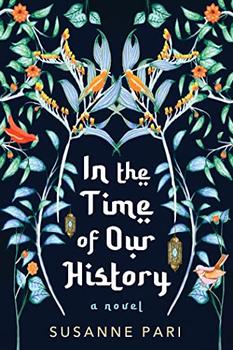Book Club Discussion Questions
In a book club? Subscribe to our Book Club Newsletter!
For supplemental discussion material see our Beyond the Book article, Iranian Americans and our BookBrowse Review of In the Time of Our History.
Please be aware that this discussion guide will contain spoilers!
- Mitra and Anahita are first generation Americans, while the rest of the Jahanis are immigrants. What are some of the ways the sisters are different from the others, and do you think the presence of the extended family in their lives influenced their personalities and choices?
- In the Time of Our History tells the story of a secular and educated immigrant family, most of whose members have resettled in the United States because of a Revolution that gave rise to a brutal regime in Iran. Can you imagine yourself in a similar situation? How do you think you would cope with exile and migration to a foreign country? Many of the Jahanis cling to old traditions in order to retain a sense of belonging. Which beliefs and norms would you try to preserve?
- Mitra and Anahita's childhood relationship was strained, as many sibling relationships are. As adults, however, they have a strong and loving bond. Do you think this would have been the case if Mitra had not discovered Kareem molesting Anahita?
- Revelation and growth is a theme for many of this novel's characters. Could you relate to Shireen's journey away from stalwart wife toward independent woman? If Anahita and the children hadn't died, do you think Shireen would have taken this path?
- The romance between Mitra and Julian is complex. While their devotion to each other may run true and deep, there are obstacles that stand in the way of a future for them together. Do you think these obstacles could have been overcome?
- Yusef is depicted mostly as a ruthless and narcissistic patriarch, not to mention a cold and unfaithful husband. And yet, he also has a traumatic history. Did this history of trauma excuse any of his behavior? And does he achieve some redemption in your mind in the end?
- Both Salimeh and Zoya are refugees. How are they similar? How are they different? If they wound up on your doorstep, would you help one or both or neither?
- Do you think Kareem was let off too easily? If so, how do you think he should have paid for his actions?
- What was your reaction to this sentence at the beginning of Part 3? "He understood that in all but a few earthly societies, rebellion in women is the same as insanity.
- Healing in the wake of grief is a theme in this novel. What did you think of the One Year tradition? Are there any traditions or rituals your own family or community follows after a loved one dies? How do they help with the grieving process?
- Child sexual abuse in families is widespread across ethnic, cultural, and socioeconomic lines. Each incident is unique, and each victim is affected uniquely. In what ways do you think Anahita's trauma played a role in her decision to pursue a relationship with Aden? How do you think the story would have been different if Anahita hadn't kept so many secrets from Mitra?
- Since the 1979 Islamic Revolution and the US Embassy Hostage Crisis, Iran and its society have been closed to most Americans. In the Time of Our History gives us a peek into that world through several characters' eyes. Were you surprised by the unconventional shape of Olga's life? Were you sympathetic to Zoya's plight? Could you relate to Golnaz's discomfort in visiting her birth country? Did reading In the Time of Our History alter your view of Iran and/or Iranians?
- Autocracies survive when they can control the substance and flow of information to their citizens. This requires a ruthless vigilance to silence intellectuals and creatives. Have you ever been in a situation where you were afraid of writing or saying something you believed?
Download the complete Book Club Kit, including discussion topics, author Q&A and more.
Unless otherwise stated, this discussion guide is reprinted with the permission of Kensington Publishing.
Any page references refer to a USA edition of the book, usually the trade paperback version, and may vary in other editions.
